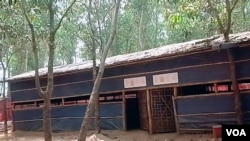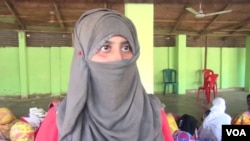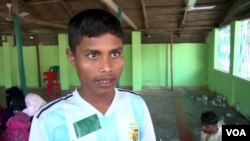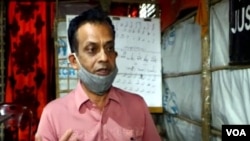Kayaphuri School headmaster Mohammad Showife was printing out questions for the ninth-grade exams when armed police raided his office at Bangladesh’s largest private school for Rohingya refugees.
The 32-year-old Showife told VOA that the police confiscated his computer and printer, and in the morning, returned to seize benches and whiteboards and lock the school’s door.
"Police asked whether we had any official permission for the school," he said. "We didn't have any in a written format. Our leader, Mohib Ullah, got verbal permission from camp in-charge [an official appointed by the government] to open the school. Now all of a sudden, the Bangladesh government decides to close it down."
The secondary school, founded in 2019 by a Rohingya leader who was killed last year, was the latest of roughly 30 such institutions in Rohingya camps to be closed by the police or that closed on their own in face of the police closures since December.
With the March 24 shutdown of the Kayaphuri School in the Kutupalaung Rohingya refugee camp in southern Bangladesh, no more such schools remain in operation.
These makeshift structures of bamboo and tarpaulins, with minimal classroom facilities inside, served as lifelines for thousands of Rohingya children with very limited access to schools in the camps. The government did not grant legal status to the refugee-led schools but agreed in 2020 to allow them to operate and promised aid if needed.
However, Bangladesh’s Office of the Refugee Relief and Repatriation Commissioner, responsible for humanitarian assistance for Rohingya refugees, said December 13 that all such private schools in the Rohingya camps "must be shut down" as they were "illegal" because they did not have official permission to operate.
After the order, armed police began raiding the schools and confiscating school assets, including benches, whiteboards and, in some cases, computers, multiple sources told VOA.
Human Rights Watch claimed Bangladesh officials threatened to seize Rohingya refugees’ identification documents and forcibly relocate them to a remote, flood-prone island if they violated the ban on the schools.
"First the government blocked meaningful education for Rohingya children, then it closed the schools Rohingya set up for themselves, and now it threatens to banish teachers and students to a prison-like island," Human Rights Watch’s Bill Van Esveld said.
Closure of largest school
Showife, the Kayaphuri headmaster, said he had been fearing a raid two other private schools were similarly closed down by armed police.
Eight-grader Rabeya Akter, 15, said the closure has shattered her dream of becoming an engineer.
"After we fled Myanmar in 2017, we were idle for a year and a half, but this school gave us the chance to resume our education. Now that it has closed we are idle again. I am worried because my family might want to marry me off. I don’t want to get married so early," she told VOA.
Ninth-grade student Ayatullah, who goes by one name, 17, struck a similar chord.
"Life inside the refugee camp is very boring. We don't have much to do. This school gave our life a meaning. I was dreaming of becoming a doctor. Now it's all gone. There are no other ways for us to get further education," he said.
'Illegal establishments'
Authorities, defended their actions, saying they have only stopped the operations of “illegal establishments.”
In an interview with VOA, Additional Refugee, Relief and Repatriation Commissioner Mohammad Shamsud Douza said, “Would you allow an illegal establishment to operate in your premises for long? I guess not.”
Douza said the Kayaphuri school did not have permission to operate and that some of its teachers were teaching the official Bangla language, which the government prohibits as part of its effort to keep Rohingyas from integrating and remaining permanently in the country.
Douza said UNICEF is taking the lead in teaching Rohingya children and has been running thousands of learning centers and schools inside the camps.
The UNICEF office in Bangladesh said in an email to VOA that over 350,000 Rohingya refugee children are enrolled in 3,200 learning centers in the Cox’s Bazar Rohingya refugee camps, 2,800 of which are supported by UNICEF.
Abdur Rahim, leader of the Arakan Rohingya Society for Peace and Human Rights, a Rohingya advocacy group, told VOA the learning centers teach children up to age 14, but the teaching does not go past second grade.
"After that our children have no education facilities. That's why we had started those private schools inside the camps so that our children could get secondary level education," Rahim said.
Thousands of school-age children between 14 and 18 years old are left with no education facility inside the camp, he said.
"Their futures are bleak," he said.














